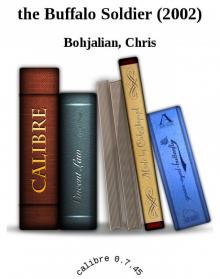- Home
- Bohjalian, Chris
Midwives (1997) Page 16
Midwives (1997) Read online
Page 16
"I couldn't hear everything."
"He's a good friend," she said instead of answering my question. I don't think it was a conscious evasion, but she quickly continued, "I think I'm on my own for the prenatals tomorrow."
"Anne doesn't do much yet anyway, does she?"
"She does her share. She's learning."
"It sounds like she's got a lot to learn."
My mother looked at me for a long moment, and I worked hard to maintain eye contact. I think she realized in that second just how much I understood: how much she needed to share with me, and how much she didn't. She didn't blink, and if the cluster flies in our walls were not dormant that moment, they would have seen my mother's head nod just the tiniest bit. Yes, that nod agreed, she does.
Downstairs my father added water to the kettle atop the wood-stove, pushing the wrought-iron lid against the brass handle. I knew the clang it made well. A second later my mother and I both heard the brief sizzle from the drops of water that spilled down the sides of the kettle onto the soapstone surface of the stove, hot enough to turn that water to steam in an instant. He then pulled the chain of the reading lamp by the couch, and we knew he was about to come upstairs.
Finally I looked down at the edge of my quilt, unable to meet my mother's gaze any longer.
"Sleep well, sweetie," she said. "Sweet dreams."
"You, too, Mom," I answered, and somewhere inside her she found the strength to murmur the lie that she would.
Chapter 11.
$25,000. A two and a five and three zeros--five zeros if you're using a decimal point. Not a whole lot less than it took to buy this whole house not that many years ago. The cost of two years of college for Connie. The cost of my baby's entire college education, with change, if she decides she wants to go to the University of Vermont.
Until today, Rand and I had never written one check that big. Technically, I guess, I still haven't. It was Rand who actually tracked down a pen in the kitchen drawer and wrote out the words "Twenty-five thousand dollars" on that line checks have right below "Pay to the Order of." Then he scribbled the two and the five and all those zeros.
And that $25,000 is just the beginning. "The retainer to get the clock started," Stephen Hastings said. "The money to feed the meter." And now the meter's running.
I was very disturbed by the amount at first, and I found myself wishing we were eligible for the public defender, but we're not. I kept hearing these words in my head, this sentence: "Man, that's a lot of bread." That's what we used to say: "A lot of bread." Grass might be a lot of bread, or a car--used or dented or wrecked by some sort of really hideous orange paint that someone thought was psychedelic--or a pair of stereo speakers.
I told Rand it was too much money, especially since we'll need a lot more if this thing drags on. It's almost our entire life savings, almost all of the money we've squirreled away for over a decade for Connie's college or our retirement or both.
Besides, I haven't done anything wrong. And so I said to Rand maybe we didn't have to have the best attorney we could find, or the best lawyer money could buy. It's not like I was caught robbing a bank with a machine gun.
But Rand disagreed, and said it didn't matter whether I'd done anything wrong, that wasn't the point. The point was that a woman had died doing something we all know the state hates, and that was having her baby at home. And so someone will have to be held accountable.
In the old days, of course, he would have called the state "the establishment."
In my mind, I can see Rand shaking his head and I can hear him saying, "Man, it will take a lot of bread to beat the establishment, but pay up we must." He didn't say that, of course. He wouldn't, not these days.
What he said was, "We want the best, and apparently that's Stephen Hastings. We shouldn't be surprised that he's the most costly."
Rand is probably right. But given who I am and what I do, Stephen Hastings is a very ironic choice. In the world of law, Stephen's as pricey as they come: He's polished and high-tech and very, very slick. Meanwhile, in the world of babies, I'm about as inexpensive as you get, a fraction of the cost of an ob-gyn. And I try hard to be unpolished and low-tech and ... earthy.
And it sounds like Stephen was in Vietnam, based on something he said to Connie. I find that very weird, too. Imagine this: It's a single day fourteen years ago. On one side of the planet, I'm in Plattsburgh in my "Drop acid, not bombs" T-shirt, putting daisies all over the wire fence at the air base and in the gun barrels of the soldiers who keep telling us we have to stop. And somewhere on the other side of the planet it's nighttime, and there's this guy from Vermont named Stephen Hastings who's up to his hips in some swamp or rice paddy. And now that guy's defending me.
I do believe this will all be fine in the end, at least partly because Stephen seems to be such a good lawyer. But also because I was trying to do the right thing when I decided to save Veil.
Stephen seems to understand that. He may be polished and slick and a high-tech kind of guy, but I can see myself delivering his wife's or girlfriend's baby someday in their home. Maybe Stephen will be my first lawyer daddy. That'd be cool.
I know he doesn't have any children yet, and I know he's no longer married. I wonder if he has a girlfriend back in Burlington.
--from the notebooks of Sibyl Danforth, midwife
HOW HIGH DOES BLOOD SPURT from a beating heart? For my mother, the question lost its rhetorical or theoretic flourish, and became instead one of pathological and clinical detail: In her mind, there was a tangible, perhaps even mathematical, connection between the power of the pulse and the height of the geyser at the point of incision.
For Stephen Hastings, however, the issue became one of mere staging and lighting: logistics, not pathology. It didn't matter to him how high into the air a beating heart could arc a fountain of blood, or whether the red crescent was narrow or squat--a water pistollike squirt, or the burp of a water balloon burst with a pin. Although my mother's fate would indeed depend in large measure upon who would win the battle of the experts Stephen waged with Bill Tanner--his doctors versus the State's, his midwives versus theirs--on this one question he didn't worry much about medical testimony. He worried instead about blocking, and where Asa Bedford and Anne Austin were standing when my mother took a kitchen knife and first pierced Charlotte's skin:
STEPHEN HASTINGS: And then you asked if your wife was dead?
ASA BEDFORD: Yes, sir.
HASTINGS: And Sibyl told you she was?
BEDFORD: That's right.
HASTINGS: So what did you do next?
BEDFORD: I didn't do anything.
HASTINGS: I believe, Reverend Bedford, we've already established that you went to the window. Correct me if I'm mistaken.
BEDFORD: No, I didn't understand the question. I thought you wanted to know if I did something ... medical.
HASTINGS: You went to the window?
BEDFORD: Yes.
HASTINGS: To look outside?
BEDFORD: I guess.
HASTINGS: You looked out the window. Did you watch it snow?
BEDFORD: I don't remember, but I probably did. At least for a second or two. But then I looked back at Charlotte.
HASTINGS: From the window.
BEDFORD: Yes, sir.
HASTINGS: (motions toward easel with overhead drawing of the Bedford bedroom, State's 8 for identification) How far is the window from the bed?
BEDFORD: Not far. A couple of feet.
HASTINGS: Two feet?
BEDFORD: No, further.
HASTINGS: Three?
BEDFORD: No.
HASTINGS: Five?
BEDFORD: Maybe. It might be more.
HASTINGS: Seven?
BEDFORD: I don't know, I've never measured it.
HASTINGS: But you think it might be as much as seven feet away?
BEDFORD: Or as little as five.
HASTINGS: (at easel) Using the State's diagram and the State's scale, it's six feet, eight inches from the cent
er of the bed to the glass. Does that sound right to you?
BEDFORD: It sounds ... fine.
HASTINGS: Thank you. Was the sun up?
BEDFORD: No, sir, it was still dark out.
HASTINGS: So you did look outside.
STATE'S ATTORNEY WILLIAM TANNER: Objection. Asked and answered. JUDGE HOWARD DORSET: Sustained.
HASTINGS: It was still night?
BEDFORD: It was still dark. It wasn't night. It was dark because of the storm. The clouds.
HASTINGS: And so the only light in the room came from the lamps?
BEDFORD: Yes, but I could see Charlotte.
HASTINGS: (motions toward diagram) Was the floor light on? The one in the corner?
BEDFORD: Yes. That one had been on all night long.
HASTINGS: What about the one on the night table?
BEDFORD: Yes, that one was on, too. Sib--Mrs. Danforth had turned it on just before she began the ... the operation.
HASTINGS: Where was Sibyl standing during the operation? On which side of the bed?
BEDFORD: The far side. The side away from me.
HASTINGS: Here?
BEDFORD: Yes, sir.
HASTINGS: (presses a bright blue dot onto the drawing beside the bed) This is Sibyl. (Presses a red dot onto the drawing just inside the window) And this is you. Is this accurate?
BEDFORD: I think so.
HASTINGS: In other words, your wife was in bed, and the bed was between you and Sibyl.
BEDFORD: Exactly. From the window, I had an unobstructed view.
HASTINGS: (presses a yellow dot on top of the night table behind the defendant) And this is the light Sibyl switched on just before she rescued your baby?
BEDFORD: Yes.
HASTINGS: (presses a second yellow dot in the corner of the bedroom behind the defendant) And this is the light that was on most of the night?
BEDFORD: Right.
HASTINGS: Is it a bright light?
BEDFORD: No, it's soft. And it only had a low-watt bulb in it, which is why we used it for the birth. Mrs. Danforth wanted the lights to be low.
HASTINGS: And the lamp by the bed. Was that a bright light?
BEDFORD: In my opinion, it was. It was our reading light.
HASTINGS: Bright enough to cast a shadow?
TANNER: Objection. Calls for speculation.
DORSET: I'll allow it. The witness may answer.
BEDFORD: I guess.
HASTINGS: A hundred-watt bulb?
BEDFORD: Most of the time.
HASTINGS: Most of the time?
BEDFORD: If the bulb blew and we had a hundred-watt bulb in the house, that's what we'd use. If we didn't, we'd use the next best thing. Maybe a seventy-five-watt bulb.
HASTINGS: The night Veil was born, you had a hundred-watt bulb in that lamp, is that correct?
BEDFORD: Yes, I think so.
HASTINGS: It was intense?
BEDFORD: Yes, sir,
HASTINGS: (at State's diagram, presses a finger on the dot signifying Mrs. Danforth and a finger on the dot representing the lamp on the night table) And we're in agreement that this is the right spot in the room for the lamp, and the right spot for Sibyl?
BEDFORD: Yes.
HASTINGS: And the lamp was on?
BEDFORD: The lamp was on.
HASTINGS: Where was the shadow?
BEDFORD: The shadow?
HASTINGS: A lamp bright enough for reading will always cast a shadow. Isn't that right?
BEDFORD: I guess so.
HASTINGS: Well, Sibyl had a lamp with a hundred-watt bulb in it right behind her, and when she hunched over your wife--her upper body exactly between that lamp and your wife--there had to have been a shadow. Correct?
BEDFORD: It would seem so.
HASTINGS: The night your son was born--Veil--where would the light from the hundred-watt bulb behind Sibyl have cast its shadow?
BEDFORD: On the bed.
HASTINGS: Please look at the diagram of the bedroom. Where on the bed would that shadow have fallen? (Presses finger in middle of bed) Here?
BEDFORD: Probably.
HASTINGS: Where is my finger?
BEDFORD: On the bed.
HASTINGS: What part of the bed?
BEDFORD: The middle.
HASTINGS: What was in the middle of the bed the night your son was born?
BEDFORD: My wife, of course. It's where she lab--
HASTINGS: The shadow from the lamp fell on your wife?
BEDFORD: Yes.
HASTINGS: On her torso?
BEDFORD: I guess.
HASTINGS: Thank you. Do you remember what Sibyl was wearing that night?
BEDFORD: I think she was wearing a sweater and blue jeans. A heavy sweater.
HASTINGS: A ski sweater?
BEDFORD: I've never skied.
HASTINGS: But a heavy sweater?
BEDFORD: Yes.
HASTINGS: Do you remember what color it was?
BEDFORD: No, sir.
HASTINGS: (shows article of clothing to state's attorney and Judge Dorset; sweater is admitted into evidence) Your Honor, Defense's three for identification. Is this the sweater Sibyl was wearing?
BEDFORD: I think so.
HASTINGS: What color is it?
BEDFORD: Navy blue. And the snowflakes around the shoulders and collar are white.
HASTINGS: But it's mostly navy blue?
BEDFORD: Mostly.
HASTINGS: (shows sweater to jury and puts it on evidence cart) We've established that Veil was born sometime between six-fifteen and six-twenty in the morning. Correct?
BEDFORD: Correct.
HASTINGS: Did you sleep at all the night before?
BEDFORD: No, I did not.
HASTINGS: Had you napped the day before? In the afternoon, maybe?
BEDFORD: No.
HASTINGS: Do you remember what time you got up the day before? Thursday?
BEDFORD: Not exactly. But it was probably around six-thirty.
HASTINGS: So you'd been up all night when your son was born?
BEDFORD: That's right.
HASTINGS: In fact, you'd been awake for just about twenty-four hours.
BEDFORD: Yes.
HASTINGS: Were your eyes tired?
BEDFORD: I don't remember thinking they were.
HASTINGS: Might they have been?
TANNER: Objection.
DORSET: I'll allow it.
HASTINGS: After being awake for twenty-four hours, might your eyes have been tired?
BEDFORD: It's possible.
HASTINGS: Thank you. Now, you've told the court that you think you may have seen this bit of blood spurt, despite the fact that you were almost seven feet away when it happened. Am I correct?
BEDFORD: Yes.
HASTINGS: And despite the fact that your wife's stomach was covered in shadow. Correct?
BEDFORD: Yes.
HASTINGS: And despite the fact that you would have been seeing this blood against the backdrop of a navy blue ski sweater. Right?
BEDFORD: Yes, but--
HASTINGS: And despite the fact that you had been awake all night long. No, not just all night. A full twenty-four hours. Is that the testimony you actually want the jury to believe?
BEDFORD: I know what I saw.
DORSET: Does counsel have any further questions for the witness?
HASTINGS: Yes.
DORSET: Then please proceed.
HASTINGS: Did you believe your wife was dead when you went to the window?
BEDFORD: Oh, yes.
HASTINGS: Did you love her?
BEDFORD: Of course.
HASTINGS: Were you sad?
BEDFORD: Good Lord, yes!
HASTINGS: Were you very sad?
BEDFORD: Yes
HASTINGS: And was it in that frame of mind that you think you saw blood spurt?

 the Buffalo Soldier (2002)
the Buffalo Soldier (2002) the Law Of Similars (1998)
the Law Of Similars (1998) Midwives (1997)
Midwives (1997)